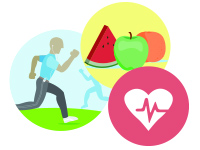Article Title | Reduce your Risk for Cancer! | Post Date | Posted on
Friday, November 17, 2017 | Rollup Image | | Body |  Statistics show that one in two men and one in three women will get cancer over their lifetime if they do not die from another disease first (National Cancer Institute, 2016). Research has shown that two main factors, poor diet and lack of physical activity, can increase the risk. Other factors include alcohol use, smoking, environmental carcinogens, and genetics (American Cancer Society, 2017). Statistics show that one in two men and one in three women will get cancer over their lifetime if they do not die from another disease first (National Cancer Institute, 2016). Research has shown that two main factors, poor diet and lack of physical activity, can increase the risk. Other factors include alcohol use, smoking, environmental carcinogens, and genetics (American Cancer Society, 2017). What can you do to reduce your risk of cancer? - To start, take care of yourself by controlling and maintaining a healthy weight. Excess weight causes the body to produce and circulate more estrogen and insulin. These hormones can stimulate cancer growth. Consult your doctor or a dietitian to determine your healthy weight.
- Cut down your usual portion size. Limit sugars, candies, and cakes. Substitute sugary drinks with water. Observe your habits. It might help you to change just one habit at a time; for example, cutting down sodas and substituting with water can eliminate one pound per month.
- Be physically active. Walking is a good beginning. Start slowly and your body will tell you when to increase the pace. Increasing physical activity helps reduce your risk for not only cancer but also diabetes and heart disease. Make sure you do at least 150 minutes (two hours and thirty minutes) a week of moderate intensity or 75 minutes of vigorous intensity activity each week, or an equivalent combination, preferably spread throughout the week. For more extensive health benefits, 300 minutes (5 hours) a week is recommended.
- Learn to meditate, take deep breaths and exhale slowly. This will bring much needed oxygen to your brain cells. Limit sedentary behaviors like sitting down and watching TV or another screen for too long.
- Research indicates that eating a variety of dark green, leafy vegetables such as spinach, collard greens, mustard greens, and kale, lowers your risk for a variety of cancers (American Institute for Cancer Research, 2007). Limit the use of cream sauces and dips on fruits and vegetables; use extra virgin olive oil and squeeze a lemon instead on salads. Enjoy fruits in their natural state with nothing added.
- Eat legumes such as peas and beans, instead of foods like French fries, potato and other chips, ice cream, donuts, and other sweets.
- Limit how much processed and red meat you eat. The International Agency for Research on Cancer (IARC) October 26, 2015, classified processed meat as carcinogen. The meat is treated in some way to preserve or flavor - salting, curing, fermenting, and smoking. Examples of processed meats are hot dogs, ham, bacon, sausage, and some deli meats. The IARC classified red meat which includes beef, pork, lamb, and goat as probable carcinogen. Grilling, frying and broiling muscle foods such as red meats, poultry and fish, can lead to the formation of cancer-causing compounds (American Institute for cancer research, 2001). To reduce the risk when grilling, marinate the meats first. This can reduce a significant amount of cancer-producing chemicals during grilling.
- Choose whole-grain breads, pasta, and cereals (such as oats and barley) instead of refined grains, and brown rice instead of white rice.
- Limit alcohol to two drinks per day for men and one drink per day for women. Researchers at the University of Florida discovered that muscadine and other red wine contains a high level and unique variety of antioxidants, which appear to prevent detrimental effects caused by alcohol to the immune system (UF- Dr. Susan Percival, 2017). This information does not mean it is safe to drink alcohol since drinking large amounts can lead to social, health as well as other physical and mental problems.
You and only you are in charge of your health. Read and learn about how the selection of foods and keeping yourself active can make a difference in your life. No one wants to feel sick and tired all the time. It is costly for you and no fun. Do something about it. Sources: Immune Benefits of Consuming Red Muscadine Wine http://edis.ifas.ufl.edu/pdffiles/FS/FS08500.pdf
Grilling Food Safely http://edis.ifas.ufl.edu/pdffiles/FM/FM39600.pdf
Green Leafy Vegetables http://edis.ifas.ufl.edu/pdffiles/FM/FM18600.pdf
National Cancer Institute https://www.cancer.gov/about-cancer/understanding/statistics
World Health Organization https://www.cancer.org/latest-news/world-health-organization-says-processed-meat-causes-cancer.html | | Attachments |
|
|
 OTHER LANGUAGES
OTHER LANGUAGES
 OTHER LANGUAGES
OTHER LANGUAGES